leave+宾语+宾补的用法doc资料
- 格式:doc
- 大小:17.50 KB
- 文档页数:5
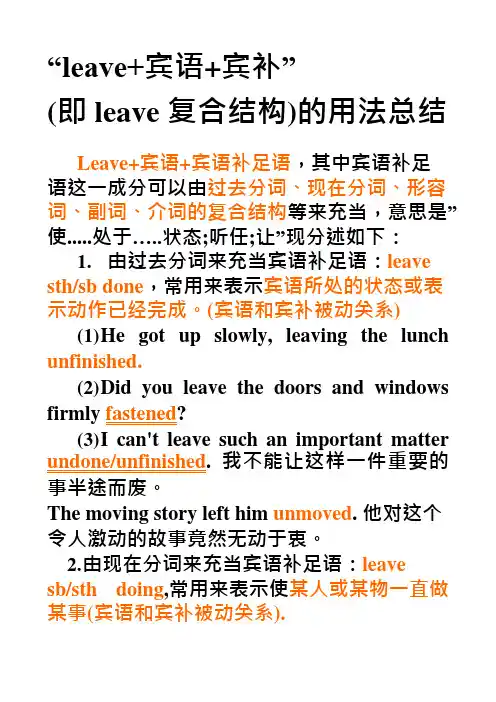
“leave+宾语+宾补”(即leave 复合结构)的用法总结Leave+宾语+宾语补足语,其中宾语补足语这一成分可以由过去分词、现在分词、形容词、副词、介词的复合结构等来充当,意思是” 使.....处于…..状态;听任;让”现分述如下:1.由过去分词来充当宾语补足语:leave sth/sb done,常用来表示宾语所处的状态或表示动作已经完成。
(宾语和宾补被动关系)(1)H e got up slowly, leaving the lunch unfinished.(2)D id you leave the doors and windows firmly fastened?(3)I can't leave such an important matter undone/unfinished. 我不能让这样一件重要的The moving story left him unmoved. 他对这个令人激动的故事竟然无动于衷。
2.由现在分词来充当宾语补足语:leavesb/sth doing,常用来表示使某人或某物一直做某事(宾语和宾补被动关系).(1)D on’t leave her waiting outside in the rain.(2)T hey went off together and left me sitting there.(3)W e left him painting the gate.△可用于被动语态:lying around.3.由形容词来充当宾语补足语:(1)Y ou’d better leave the drawing-room door open.(2)H is illness has left him weak.△可用于被动语态:The window was left open.4.由副词作宾语补足语(1)W hat has left him away for so long?什么事使他离开了这么长时间?(2)W e can’t leave the light on when leaving.5.由介词的复合结构充当宾语补足语:(1)L eave him in peace!(2)H is illness left him with a weak heart.(3)You’ve left her name off the list.(4)This matter left her without a way of hope.这件事使她没有一丝一毫的希望。
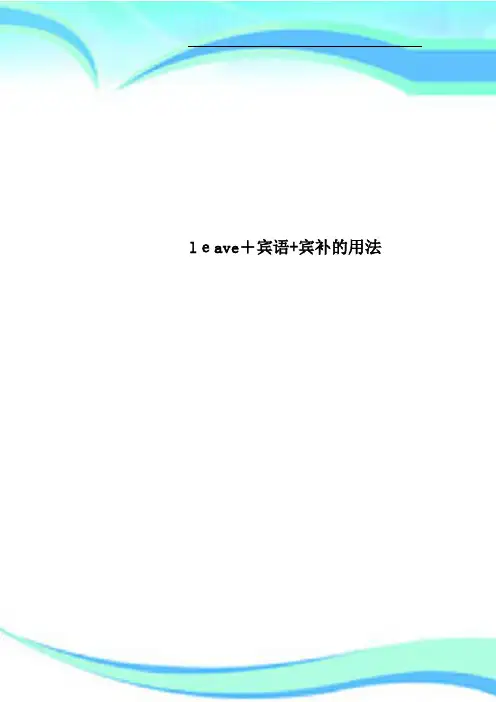
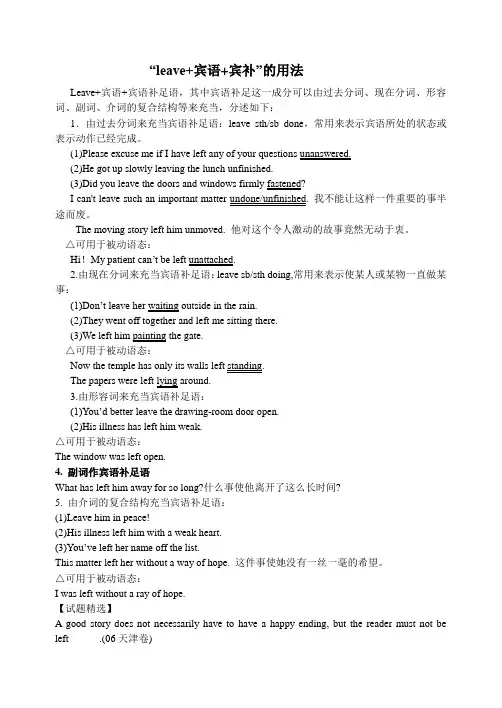
“leave+宾语+宾补”的用法Leave+宾语+宾语补足语,其中宾语补足这一成分可以由过去分词、现在分词、形容词、副词、介词的复合结构等来充当,分述如下:1.由过去分词来充当宾语补足语:leave sth/sb done,常用来表示宾语所处的状态或表示动作已经完成。
(1)Please excuse me if I have left any of your questions unanswered.(2)He got up slowly leaving the lunch unfinished.(3)Did you leave the doors and windows firmly fastened?I can't leave such an important matter undone/unfinished. 我不能让这样一件重要的事半途而废。
The moving story left him unmoved. 他对这个令人激动的故事竟然无动于衷。
△可用于被动语态:Hi!My patient can’t be left unattached.2.由现在分词来充当宾语补足语:leave sb/sth doing,常用来表示使某人或某物一直做某事:(1)Don’t leave her waiting outside in the rain.(2)They went off together and left me sitting there.(3)We left him painting the gate.△可用于被动语态:Now the temple has only its walls left standing.The papers were left lying around.3.由形容词来充当宾语补足语:(1)You’d better leave the drawing-room door open.(2)His illness has left him weak.△可用于被动语态:The window was left open.4. 副词作宾语补足语What has left him away for so long?什么事使他离开了这么长时间?5. 由介词的复合结构充当宾语补足语:(1)Leave him in peace!(2)His illness left him with a weak heart.(3)You’ve left her name off the list.This matter left her without a way of hope. 这件事使她没有一丝一毫的希望。
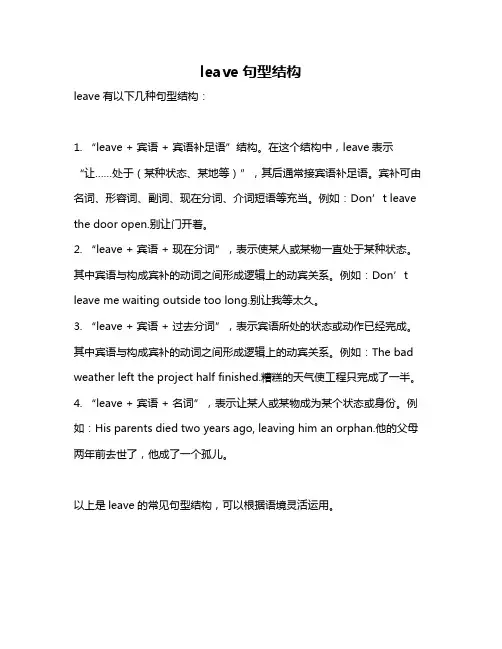
leave句型结构
leave有以下几种句型结构:
1. “leave + 宾语 + 宾语补足语”结构。
在这个结构中,leave表示“让……处于(某种状态、某地等)”,其后通常接宾语补足语。
宾补可由名词、形容词、副词、现在分词、介词短语等充当。
例如:Don’t leave the door open.别让门开着。
2. “leave + 宾语 + 现在分词”,表示使某人或某物一直处于某种状态。
其中宾语与构成宾补的动词之间形成逻辑上的动宾关系。
例如:Don’t leave me waiting outside too long.别让我等太久。
3. “leave + 宾语 + 过去分词”,表示宾语所处的状态或动作已经完成。
其中宾语与构成宾补的动词之间形成逻辑上的动宾关系。
例如:The bad weather left the project half finished.糟糕的天气使工程只完成了一半。
4. “leave + 宾语 + 名词”,表示让某人或某物成为某个状态或身份。
例如:His parents died two years ago, leaving him an orphan.他的父母两年前去世了,他成了一个孤儿。
以上是leave的常见句型结构,可以根据语境灵活运用。
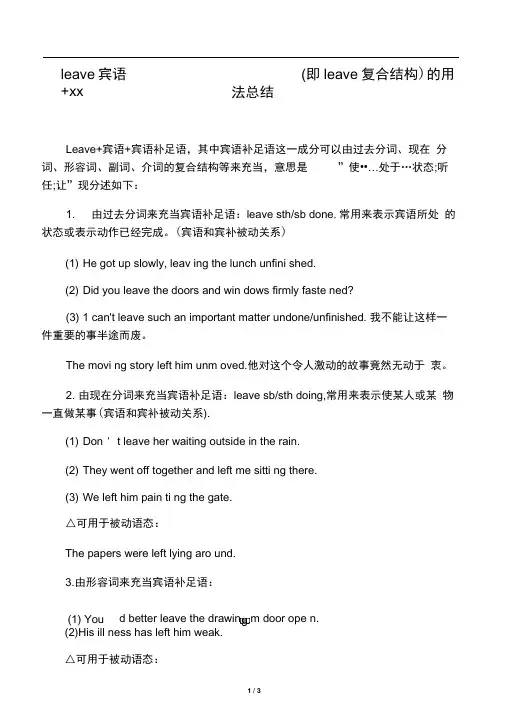
法总结Leave+宾语+宾语补足语,其中宾语补足语这一成分可以由过去分词、现在 分词、形容词、副词、介词的复合结构等来充当,意思是”使••…处于…状态;听 任;让”现分述如下:1. 由过去分词来充当宾语补足语:leave sth/sb done ,常用来表示宾语所处 的状态或表示动作已经完成。
(宾语和宾补被动关系)(1) He got up slowly, leav ing the lunch unfini shed.(2) Did you leave the doors and win dows firmly faste ned?(3) 1 can't leave such an important matter undone/unfinished. 我不能让这样一 件重要的事半途而废。
The movi ng story left him unm oved.他对这个令人激动的故事竟然无动于 衷。
2. 由现在分词来充当宾语补足语:leave sb/sth doing,常用来表示使某人或某 物一直做某事(宾语和宾补被动关系).(1) Don ' t leave her waiting outside in the rain.(2) They went off together and left me sitti ng there.(3) We left him pain ti ng the gate.△可用于被动语态:The papers were left lying aro und.3. 由形容词来充当宾语补足语:(2)His ill ness has left him weak.△可用于被动语态:leave 宾语+xx (即leave 复合结构)的用 (1) You d better leave the drawin m door ope n.The wi ndow was left ope n.4•由副词作宾语补足语(1) What has left him away for so lo ng?什么事使他离开了这么长时间?(2) We can ' t leave the light on when leaving.5.由介词的复合结构充当宾语补足语:(1) Leave him in peace!(2) His ill ness left him with a weak heart.(3) You ' ve left her name off the list.⑷This matter left her without a way of hope.这件事使她没有一丝一毫的希望。
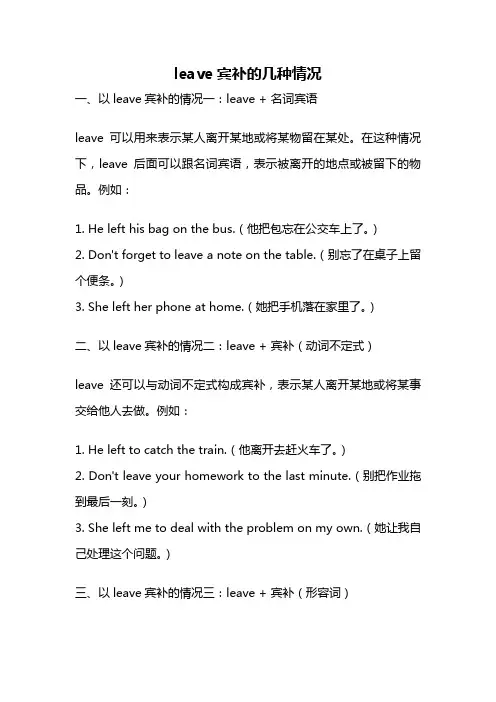
leave宾补的几种情况一、以leave宾补的情况一:leave + 名词宾语leave可以用来表示某人离开某地或将某物留在某处。
在这种情况下,leave后面可以跟名词宾语,表示被离开的地点或被留下的物品。
例如:1. He left his bag on the bus.(他把包忘在公交车上了。
)2. Don't forget to leave a note on the table.(别忘了在桌子上留个便条。
)3. She left her phone at home.(她把手机落在家里了。
)二、以leave宾补的情况二:leave + 宾补(动词不定式)leave还可以与动词不定式构成宾补,表示某人离开某地或将某事交给他人去做。
例如:1. He left to catch the train.(他离开去赶火车了。
)2. Don't leave your homework to the last minute.(别把作业拖到最后一刻。
)3. She left me to deal with the problem on my own.(她让我自己处理这个问题。
)三、以leave宾补的情况三:leave + 宾补(形容词)leave还可以与形容词构成宾补,表示某人离开后给人留下某种感觉或状态。
例如:1. The movie left me feeling inspired.(这部电影让我感到鼓舞。
)2. His words left her speechless.(他的话让她无言以对。
)3. The news left us all shocked.(这个消息让我们都感到震惊。
)四、以leave宾补的情况四:leave + 宾补(副词)leave还可以与副词构成宾补,表示某人离开后以某种方式或状态。
例如:1. He left quietly, without saying a word.(他悄悄地离开了,一言不发。
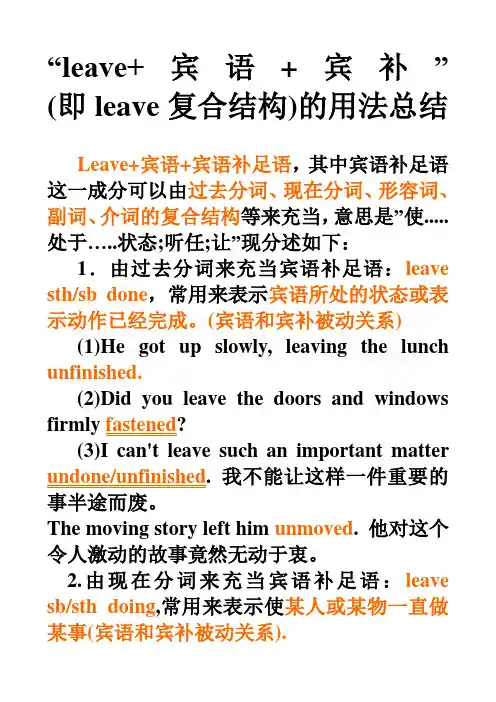
“leave+宾语+宾补”(即leave复合结构)的用法总结Leave+宾语+宾语补足语,其中宾语补足语这一成分可以由过去分词、现在分词、形容词、副词、介词的复合结构等来充当,意思是”使.....处于…..状态;听任;让”现分述如下:1.由过去分词来充当宾语补足语:leave sth/sb done,常用来表示宾语所处的状态或表示动作已经完成。
(宾语和宾补被动关系)(1)He got up slowly, leaving the lunch unfinished.(2)Did you leave the doors and windows firmly fastened?(3)I can't leave such an important matter undone/unfinished. 我不能让这样一件重要的事半途而废。
The moving story left him unmoved. 他对这个令人激动的故事竟然无动于衷。
2.由现在分词来充当宾语补足语:leave sb/sth doing,常用来表示使某人或某物一直做某事(宾语和宾补被动关系).(1)Don’t leave her waiting outside in the rain.(2)They went off together and left me sitting there.(3)We left him painting the gate.△可用于被动语态:The papers were left lying around.3.由形容词来充当宾语补足语:(1)You’d better leav e the drawing-room door open.(2)His illness has left him weak.△可用于被动语态:The window was left open.4.由副词作宾语补足语(1)What has left him away for so long?什么事使他离开了这么长时间?(2)We can’t leave the light on when leaving.5. 由介词的复合结构充当宾语补足语:(1)Leave him in peace!(2)His illness left him with a weak heart.(3)You’ve left her name off the list.(4)This matter left her without a way of hope. 这件事使她没有一丝一毫的希望。
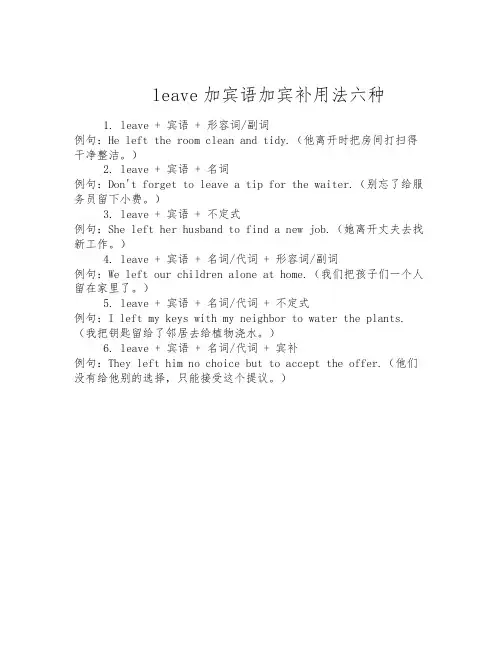
leave加宾语加宾补用法六种
1. leave + 宾语 + 形容词/副词
例句:He left the room clean and tidy.(他离开时把房间打扫得干净整洁。
)
2. leave + 宾语 + 名词
例句:Don't forget to leave a tip for the waiter.(别忘了给服务员留下小费。
)
3. leave + 宾语 + 不定式
例句:She left her husband to find a new job.(她离开丈夫去找新工作。
)
4. leave + 宾语 + 名词/代词 + 形容词/副词
例句:We left our children alone at home.(我们把孩子们一个人留在家里了。
)
5. leave + 宾语 + 名词/代词 + 不定式
例句:I left my keys with my neighbor to water the plants.(我把钥匙留给了邻居去给植物浇水。
)
6. leave + 宾语 + 名词/代词 + 宾补
例句:They left him no choice but to accept the offer.(他们没有给他别的选择,只能接受这个提议。
)。
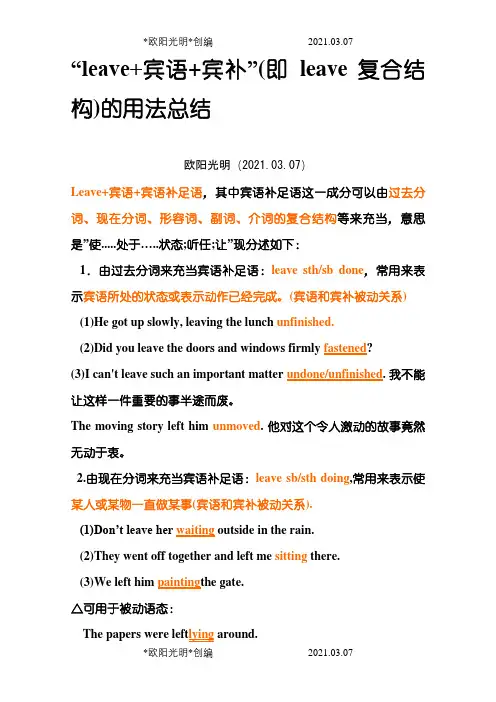
“leave+宾语+宾补”(即leave复合结构)的用法总结欧阳光明(2021.03.07)Leave+宾语+宾语补足语,其中宾语补足语这一成分可以由过去分词、现在分词、形容词、副词、介词的复合结构等来充当,意思是”使.....处于…..状态;听任;让”现分述如下:1.由过去分词来充当宾语补足语:leave sth/sb done,常用来表示宾语所处的状态或表示动作已经完成。
(宾语和宾补被动关系)(1)He got up slowly, leaving the lunch unfinished.(2)Did you leave the doors and windows firmly fastened?undone/unfinished我不能让这样一件重要的事半途而废。
The moving story left him unmoved. 他对这个令人激动的故事竟然无动于衷。
2.由现在分词来充当宾语补足语:leave sb/sth doing,常用来表示使某人或某物一直做某事(宾语和宾补被动关系).(1)Don’t leave her waiting outside in the rain.(2)They went off together and left me sitting there.(3)We left him painting the gate.△可用于被动语态:The papers were left lying around.3.由形容词来充当宾语补足语:(1)You’d better leave the drawing-room door open.(2)His illness has left him weak.△可用于被动语态:The window was left open.4.由副词作宾语补足语(1)What has left him away for so long?什么事使他离开了这么长时间?(2)We can’t leave the light on when leaving.5.由介词的复合结构充当宾语补足语:(1)Leave him in peace!(2)His illness left him with a weak heart.(3)You’ve left her name off the list.(4)This matter left her without a way of hope. 这件事使她没有一丝一毫的希望。
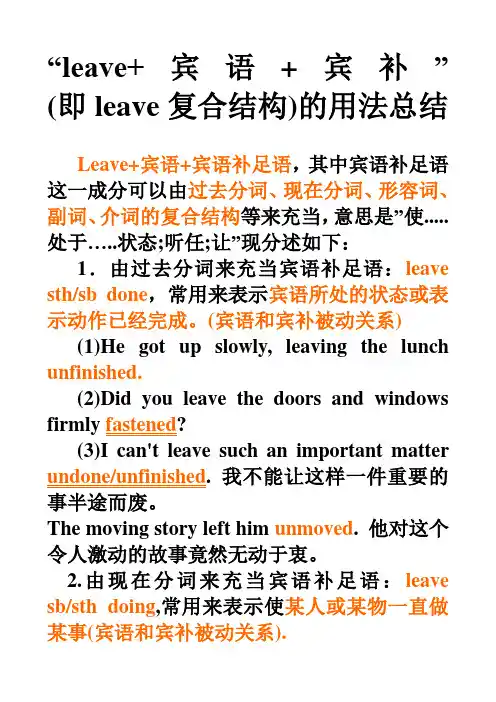
“leave+宾语+宾补”(即leave复合结构)的用法总结Leave+宾语+宾语补足语,其中宾语补足语这一成分可以由过去分词、现在分词、形容词、副词、介词的复合结构等来充当,意思是”使.....处于…..状态;听任;让”现分述如下:1.由过去分词来充当宾语补足语:leave sth/sb done,常用来表示宾语所处的状态或表示动作已经完成。
(宾语和宾补被动关系)(1)He got up slowly, leaving the lunch unfinished.(2)Did you leave the doors and windows firmly fastened?(3)I can't leave such an important matter undone/unfinished. 我不能让这样一件重要的事半途而废。
The moving story left him unmoved. 他对这个令人激动的故事竟然无动于衷。
2.由现在分词来充当宾语补足语:leave sb/sth doing,常用来表示使某人或某物一直做某事(宾语和宾补被动关系).(1)Don’t leave her waiting outside in the rain.(2)They went off together and left me sitting there.(3)We left him painting the gate.△可用于被动语态:The papers were left lying around.3.由形容词来充当宾语补足语:(1)You’d better leav e the drawing-room door open.(2)His illness has left him weak.△可用于被动语态:The window was left open.4.由副词作宾语补足语(1)What has left him away for so long?什么事使他离开了这么长时间?(2)We can’t leave the light on when leaving.5. 由介词的复合结构充当宾语补足语:(1)Leave him in peace!(2)His illness left him with a weak heart.(3)You’ve left her name off the list.(4)This matter left her without a way of hope. 这件事使她没有一丝一毫的希望。
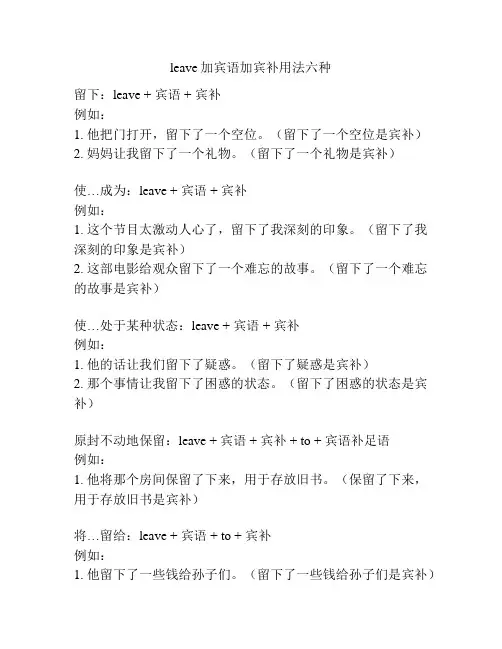
leave加宾语加宾补用法六种
留下:leave + 宾语 + 宾补
例如:
1. 他把门打开,留下了一个空位。
(留下了一个空位是宾补)
2. 妈妈让我留下了一个礼物。
(留下了一个礼物是宾补)
使…成为:leave + 宾语 + 宾补
例如:
1. 这个节目太激动人心了,留下了我深刻的印象。
(留下了我深刻的印象是宾补)
2. 这部电影给观众留下了一个难忘的故事。
(留下了一个难忘的故事是宾补)
使…处于某种状态:leave + 宾语 + 宾补
例如:
1. 他的话让我们留下了疑惑。
(留下了疑惑是宾补)
2. 那个事情让我留下了困惑的状态。
(留下了困惑的状态是宾补)
原封不动地保留:leave + 宾语 + 宾补 + to + 宾语补足语
例如:
1. 他将那个房间保留了下来,用于存放旧书。
(保留了下来,用于存放旧书是宾补)
将…留给:leave + 宾语 + to + 宾补
例如:
1. 他留下了一些钱给孙子们。
(留下了一些钱给孙子们是宾补)
2. 她把工作留给了下一个人。
(留给了下一个人是宾补)
托付给:leave + 宾语 + to + 宾补
例如:
1. 她将书册留给了我。
(留给了我是宾补)
2. 我把这个任务留给了你。
(留给了你是宾补)。
leave加宾语加宾补的用法leave这个词在英语中经常用来表示“离开”,其中常常伴随着一个宾语。
而有时候这个宾语还会带上一个宾补,这种用法在英语中叫做leave object complement。
一、基本用法leave后面加上名词作宾语,表示离开某个地方、人或事物。
1. I'm leaving home.我要离开家了。
2. She left the company last year.她去年离开了公司。
他把妻儿留在了村里。
在这些例子中,宾语分别是home、company和wife和children等。
这些名词都是表示人或事物的,而不是动作。
而且离开的对象也都是具体的,可以表示出离开的目的。
1. leave for + 地点这种用法表示离开的目的是为了去某个地方。
我妹妹昨天去了中国。
5. We are leaving for Paris tomorrow morning.明早我们要去巴黎。
这里的宾语是某个国家或城市的名称。
这个宾语表示离开的目的,而“for”则帮助确定这个目的地。
这种结构表示离开时带上了某个东西。
她带着外套和钱包离开了。
离开时别忘了带钥匙。
3. leave behind + 物品我把我的书落在了教室里。
她把她所有的朋友都离开了。
这个宾补可以是一个具体的物品,也可以是一个抽象的概念。
有时候,leave后面还可以加上一个形容词,表示离开时的状态或某种感觉。
我离开时感到很生气。
四、leave加动词不定式的用法我的朋友离开了,去坐火车。
我要离开了,开始新的生活。
这个宾补通常是动词的原形形式,这样可以准确传达出离开的目的或者愿望。
总结leave加宾语加宾补的用法比较灵活,可以根据不同的语境来做出调整。
在表达的过程中,需要注意宾语的类型、目的地、带上的物品、留下的物品,还有离开的状态和意愿等等。
只要掌握好这些要点,就可以很好地运用这种结构,用简洁而准确的语言来传达我们的意思。
leave宾补的几种情况
leave宾补是指在句子中,leave作为动词,后面跟着一个宾语
和一个宾语补语。
宾语补语是用来补充或说明宾语的内容或状态的,常常是一些形容词、名词、副词或介词短语等。
以下是一些常见的leave宾补的情况:
1. 形容词宾补:leave + 宾语 + 形容词
例如:I left the door open.(我把门开着。
)
She left the window closed.(她把窗户关着。
)
2. 名词宾补:leave + 宾语 + 名词
例如:He left his job.(他辞去了他的工作。
)
They left a mess in the kitchen.(他们在厨房里留下了一团糟。
)
3. 副词宾补:leave + 宾语 + 副词
例如:The bus left him stranded.(公交车把他丢在了那里。
)She left the door wide open.(她把门敞开着。
)
4. 介词短语宾补:leave + 宾语 + 介词短语
例如:He left the book on the table.(他把书放在了桌子上。
)They left the keys in the car.(他们把钥匙留在了车里。
)
这些只是一些常见的情况,实际上还有其他一些可以作为
leave宾补的形式。
根据具体的句子结构和意义,leave宾补的
形式可能会有所不同。
创作编号:GB8878185555334563BT9125XW创作者:凤呜大王*“leave+宾语+宾补”(即leave复合结构)的用法总结Leave+宾语+宾语补足语,其中宾语补足语这一成分可以由过去分词、现在分词、形容词、副词、介词的复合结构等来充当,意思是”使.....处于…..状态;听任;让”现分述如下:1.由过去分词来充当宾语补足语:leave sth/sb done,常用来表示宾语所处的状态或表示动作已经完成。
(宾语和宾补被动关系)(1)He got up slowly, leaving the lunch unfinished.(2)Did you leave the doors and windows firmly fastened?(3)I can't leave such an important matter undone/unfinished. 我不能让这样一件重要的事半途而废。
The moving story left him unmoved. 他对这个令人激动的故事竟然无动于衷。
2.由现在分词来充当宾语补足语:leave sb/sth doing,常用来表示使某人或某物一直做某事(宾语和宾补被动关系).waiting outside in the rain.(2)They went off together and left me sitting there.(3)We left him painting the gate. △可用于被动语态:The papers were left lying around.3.由形容词来充当宾语补足语:(1)You’d better leave thedrawing-room door open.(2)His illness has left him weak.△可用于被动语态:The window was left open.4.由副词作宾语补足语(1)What has left him away for so long?什么事使他离开了这么长时间?(2)We can’t leave the light on when leaving.5. 由介词的复合结构充当宾语补足语:(1)Leave him in peace!(2)His illness left him with a weak heart.(3)You’ve left her name off the list.(4)This matter left her without a way of hope. 这件事使她没有一丝一毫的希望。
“leave+宾语+宾补”(即leave复合结构)的用法总结之欧侯瑞魂创作Leave+宾语+宾语补足语,其中宾语补足语这一成分可以由过去分词、现在分词、形容词、副词、介词的复合结构等来充当,意思是”使.....处于…..状态;听任;让”现分述如下:1.由过去分词来充当宾语补足语:leave sth/sb done,经常使用来暗示宾语所处的状态或暗示动作已经完成。
(宾语和宾补主动关系)(1)He got up slowly, leaving the lunch unfinished.(2)Did you leave the doors and windows firmly fastened?(3)I can't leave such an important matter undone/unfinished. 我不克不及让这样一件重要的事中途而废。
The moving story left him unmoved. 他对这个令人激动的故事竟然无动于衷。
2.由现在分词来充当宾语补足语:leave sb/sth doing,经常使用来暗示使某人或某物一直做某事(宾语和宾补主动关系).waiting outside in the rain.(2)They went off together and left me sitting there.(3)We left him painting the gate.△可用于主动语态:The papers were left lying around.形容词来充当宾语补足语:(1)You’d better leave the dr awing-room door open.(2)His illness has left him weak.△可用于主动语态:The window was left open.副词作宾语补足语(1)What has left him away for so long?什么事使他离开了这么长时间?(2)We can’t leave the light on when leaving.5.由介词的复合结构充当宾语补足语:(1)Leave him in peace!(2)His illness left him with a weak heart.(3)You’ve left her name off the list.(4)This matter left her without a way of hope. 这件事使她没有一丝一毫的希望。
“leave+宾语+宾补”(即leave复合结构)的用法总结之阿布丰王创作Leave+宾语+宾语补足语,其中宾语补足语这一成分可以由过去分词、现在分词、形容词、副词、介词的复合结构等来充当,意思是”使.....处于…..状态;听任;让”现分述如下:1.由过去分词来充当宾语补足语:leave sth/sb done,经常使用来暗示宾语所处的状态或暗示动作已经完成。
(宾语和宾补主动关系)(1)He got up slowly, leaving the lunch unfinished.fastened?undone/unfinished. 我不克不及让这样一件重要的事中途而废。
The moving story left him unmoved. 他对这个令人激动的故事竟然无动于衷。
2.由现在分词来充当宾语补足语:leave sb/sth doing,经常使用来暗示使某人或某物一直做某事(宾语和宾补主动关系).waiting outside in the rain.(2)They went off together and left me sitting there.(3)We left him painting the gate.△可用于主动语态:The papers were left lying around.3.由形容词来充当宾语补足语:(1)You’d better leave the drawing-room door open.(2)His illness has left him weak.△可用于主动语态:The window was left open.4.由副词作宾语补足语(1)What has left him away for so long?什么事使他离开了这么长时间?(2)We can’t leave the light on when leaving.5.由介词的复合结构充当宾语补足语:(1)Leave him in peace!(2)His illness left him with a weak heart.(3)You’ve left her name off the list.(4)This matter left her without a way of hope. 这件事使她没有一丝一毫的希望。
“leave+宾语+宾补”(即leave复合结构)的用法总结之杨若古兰创作Leave+宾语+宾语补足语,其中宾语补足语这一成分可以由过去分词、此刻分词、描述词、副词、介词的复合结构等来充当,意思是”使.....处于…..形态;听任;让”现分述如下:1.由过去分词来充当宾语补足语:leave sth/sb done,经常使用来暗示宾语所处的形态或暗示动作曾经完成.(宾语和宾补自动关系)(1)He got up slowly, leaving the lunch unfinished.(2)Did you leave the doors and windows firmly fastened?undone/unfinished. 我不克不及让如许一件主要的事半途而废.The moving story left him unmoved. 他对这个令人激动的故事竟然无动于中.2.由此刻分词来充当宾语补足语:leave sb/sth doing,经常使用来暗示使某人或某物不断做某事(宾语和宾补自动关系).(1)Don’t leave her waiting outside in the rain.(2)They went off together and left me sitting there.(3)We left him painting the gate.△可用于自动语态:lying around.描述词来充当宾语补足语:(1)You’d better leave the drawing-room door open.(2)His illness has left him weak.△可用于自动语态:The window was left open.副词作宾语补足语(1)What has left him away for so long?什么事使他离开了这么长时间?(2)We can’t leave the light on when leaving.5.由介词的复合结构充当宾语补足语:(1)Leave him in peace!(2)His illness left him with a weak heart.(3)You’ve left her name off the list.(4)This matter left her without a way of hope. 这件事使她没有一丝一毫的但愿.△可用于自动语态:I was left without a ray of hope.名词作宾语补足语The earthquake left him an orphan.【试题精选】1.A good story does not necessarily have to have a happy ending, but the reader must not be left______.(06天津卷)A.unsatisfiedB.unsatisfyingC.tobeunsatisfyingD.being unsatisfied2. His remarks left me ______ about his real purpose.A. wonderedB. wonderC. to wonderD. wondering3. John rushed out in a hurry, ______ the door _______.A.leaving, unlockedB. leaving, unlockingC. left, unlockedD. to leave, unlocking4. Don’t leave the water ______ while you brush your teeth.A. runningB. runC. being runD. to run答案:A D A A。
l e a v e+宾语+宾补的
用法
“leave+宾语+宾补”
(即leave复合结构)的用法总结
Leave+宾语+宾语补足语,其中宾语补足语这一成分可以由过去分词、现在分词、形容词、副词、介词的复合结构等来充当,意思是”使.....处于…..状态;听任;让”现分述如下: 1.由过去分词来充当宾语补足语:leave sth/sb done,常用来表示宾语所处的状态或表示动作已经完成。
(宾语和宾补被动关系)
(1)He got up slowly, leaving the lunch unfinished.
(2)Did you leave the doors and windows firmly fastened?
(3)I can't leave such an important matter undone/unfinished. 我不能让这样一件重要的事半途而废。
The moving story left him unmoved. 他对这个令人激动的故事竟然无动于衷。
2.由现在分词来充当宾语补足语:leave
sb/sth doing,常用来表示使某人或某物一直做
某事(宾语和宾补被动关系).
waiting outside in the rain.
(2)They went off together and left me sitting there.
(3)We left him painting the gate.
△可用于被动语态:
The papers were left lying around.
3.由形容词来充当宾语补足语:
(1)You’d better leave the drawing-room door open.
(2)His illness has left him weak.
△可用于被动语态:
The window was left open.
4.由副词作宾语补足语
(1)What has left him away for so long?什么事使他离开了这么长时间?
(2)We can’t leave the light on when leaving.
5. 由介词的复合结构充当宾语补足语:
(1)Leave him in peace!
(2)His illness left him with a weak heart.
(3)You’ve left her name off the list.
(4)This matter left her without a way of hope. 这件事使她没有一丝一毫的希望。
△可用于被动语态:
I was left without a ray of hope.
5.由名词作宾语补足语
The earthquake left him an orphan.
【试题精选】
1.A good story does not necessarily have to have a happy ending, but the reader must not be left______.(06天津卷)
A.unsatisfied
B.unsatisfying
C.to be unsatisfying D.being unsatisfied
2. His remarks left me ______ about his real purpose.
A. wondered
B. wonder
C. to wonder
D. wondering
3. John rushed out in a hurry, ______ the door _______.
A.leaving, unlocked
B. leaving, unlocking
C. left, unlocked
D. to leave, unlocking
4. Don’t leave the water ______ while you brush your teeth.
A. running
B. run
C. being run
D. to run
答案:A D A A。